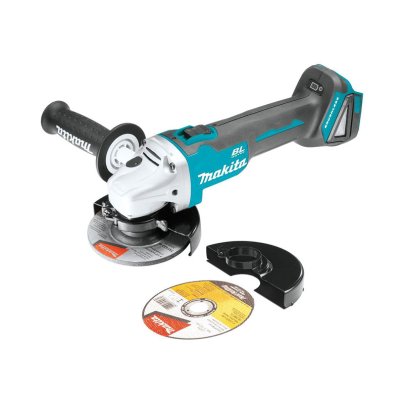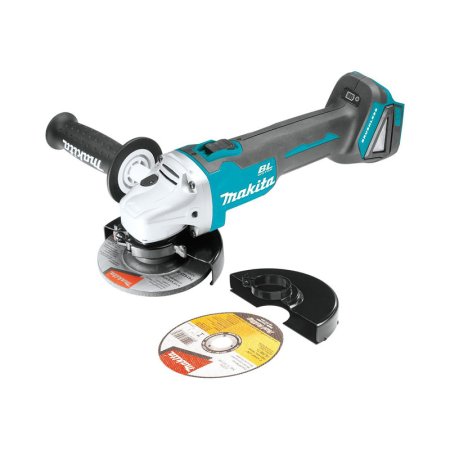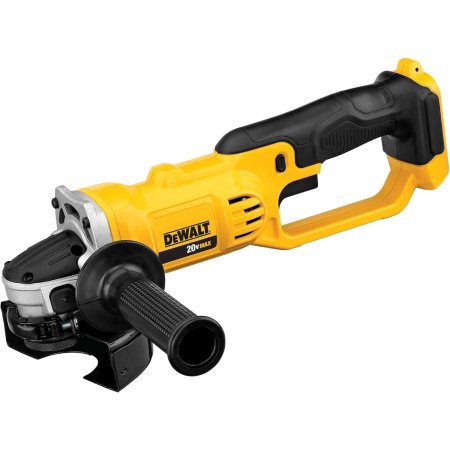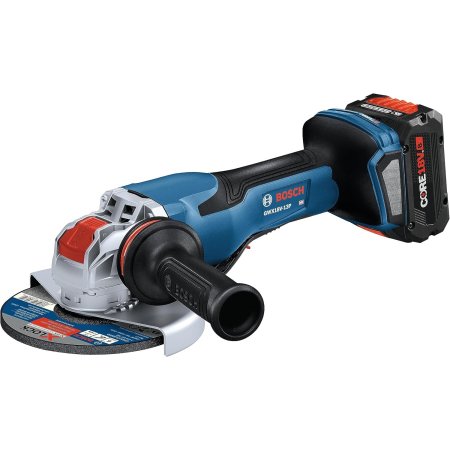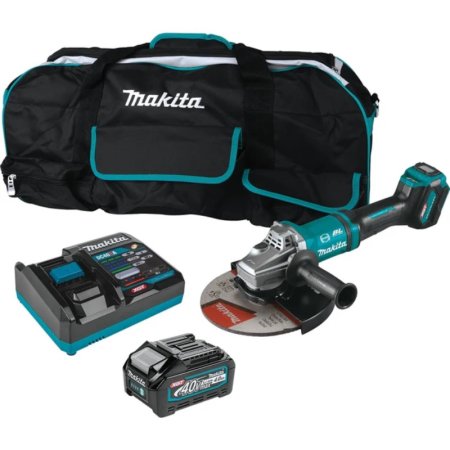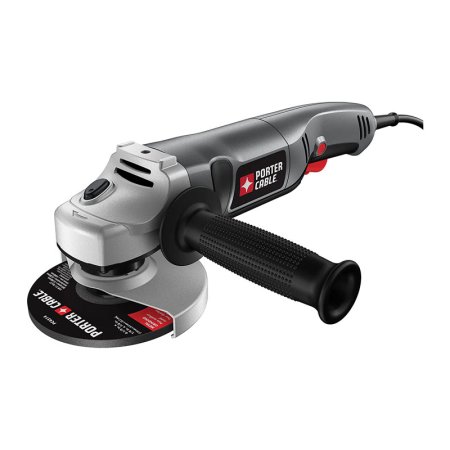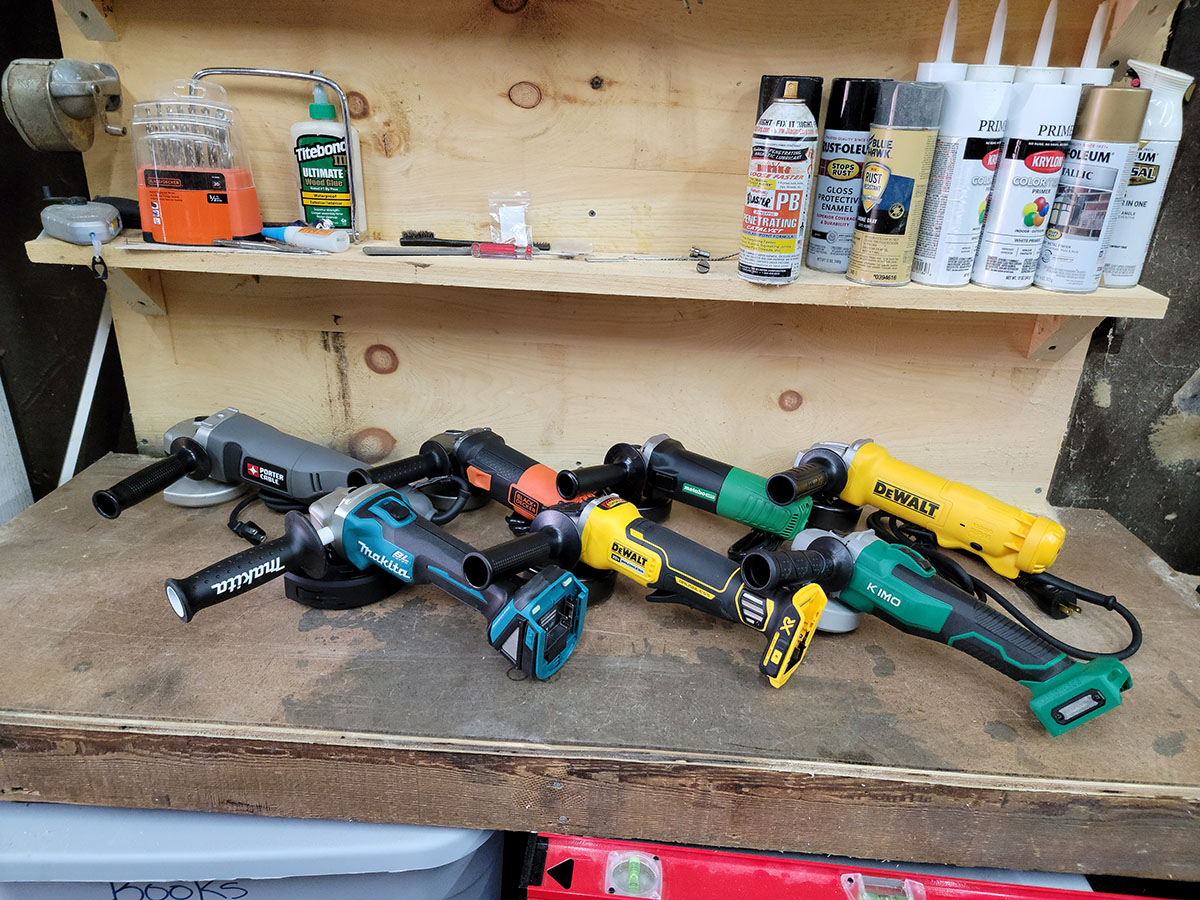
We may earn revenue from the products available on this page and participate in affiliate programs. Learn More ›
Although they’re often overshadowed by flashier power tools, angle grinders are workhorses that are indispensable for cutting, grinding, polishing, and more. We researched over 25 top-rated angle grinders and then chose nine for hands-on testing in our garages and workshops. The Makita 18V LXT Cordless Cut-Off/Angle Grinder earned the top spot in our tests for its easy-to-use automatic speed and torque adjustment, lock-on switch, and top speed of 8,500 revolutions per minute (RPM).
Read on to learn more about this versatile tool and find out how the following models earned a spot in our lineup of the best angle grinders.
- BEST OVERALL: Makita 18V LXT Cordless Cut-Off/Angle Grinder
Jump to Review - BEST BANG FOR THE BUCK: DeWalt DCG412B Cordless 4.5-Inch Angle Grinder
Jump to Review - BEST FOR RUST REMOVAL: Bosch ProFactor 18V X-Lock Angle Grinder Kit
Jump to Review - BEST 7- TO 9-INCH: Makita 40V Max XGT Paddle Switch Angle Grinder Kit
Jump to Review - BEST KIT: DeWalt DCG413B 20V MAX XR Brushless Cut Off/Grinder
Jump to Review - BEST CORDED: Porter-Cable 7.5-Amp Small Angle Grinder Tool
Jump to Review - BEST HEAVY-DUTY: DeWalt DWE402 4.5-Inch Small Angle Grinder Tool
Jump to Review

| Testing Stats | |
| Products tested | 9 |
| Time spent testing | 11 hours |
| Tests performed | 3 |
| Price range | $45 to $555 |
Our Top Picks
Based on their quality of features and performance, these are the best angle grinders for DIYers and pros alike.
Best Overall
Makita 18V LXT Cordless Cut-Off/Angle Grinder
This Bob Vila Approved product carries our brand’s highest level of recommendation.

Bob Vila Approved recognizes the household and DIY products that impressed us most in our real-world testing and that exemplify core values of the Bob Vila brand, including craftsmanship, innovation, and value for the dollar. Winners of this designation come recommended by our professional review team and are personally approved by Bob Vila.
Our Ratings: Ease of Use 4/5; Performance 5/5; Maneuverability 5/5; Handle Comfort 5/5; Value 5/5
Product Specs
- Disc size: 4.5 to 5 inches
- RPM: 8,500
- Power source: 18-volt (V) lithium-ion battery
What We Like
- On-position lock
- Automatically adjusts speed and torque
- Slow start reduces jumps
- Very little noticeable vibration
What We Don’t Like
- Battery or charger not included
- Guard is a bit finicky
The Makita XAG04Z is worth checking out by anyone looking for the best cordless angle grinder performance. This top-rated angle grinder features a top speed of 8,500 RPM thanks to its brushless motor and the 18V lithium-ion battery. It can handle 4.5- and 5-inch discs.
We found the XAG04Z excellent to work with. While it doesn’t boast the highest top speed, the automatic speed adjustment enabled it to maintain speed during tough cuts and grinds. We noticed very little vibration thanks to the rubber over-molded grip and handle, and the lock-on switch proved to be a huge plus. There’s not much to complain about, but two downsides are that it was a little awkward to assemble the two-piece handguard, and we think it would be nice if the tool came with a battery and a charger.
Read our full review:Makita 18V LXT Cordless Cut-Off/Angle Grinder
Get the Makita 18V angle grinder at Amazon, Ace Hardware, or The Home Depot.
Best Bang For The Buck
DeWalt DCG412B Cordless 4.5-Inch Angle Grinder
Our Ratings: Ease of Use 4.5/5; Performance 4.8/5; Maneuverability 4.5/5; Handle Comfort 4.5/5; Value 5/5
Product Specs
- Disc size: 4.5 to 5 inches
- RPM: 8,000
- Power source: 20V lithium-ion battery
What We Like
- Accepts 4.5- and 5-inch discs
- Compatible with all DeWalt 20V batteries
- Powerful 8,000 RPM motor
- Tool-free wheel change
What We Don’t Like
- Tool only; doesn’t come with battery
If you’re a fan of DeWalt’s 20V MAX power tool line, check out the DCG412B angle grinder, which sells at a budget-friendly price. This is another tool-only pick, but it accepts all DeWalt 20V rechargeable batteries, so you can swap between tools as needed.
This is a powerful grinder, and it accepts both 4.5- and 5-inch discs with standard ⅝-inch arbors. The DCG412B is a workhorse. It doesn’t come with many bells and whistles, but if you’re looking for a powerful angle grinder with tool-free wheel change that boasts 8,000 RPM, you won’t regret buying it.
This DeWalt model excelled in our tests, quickly removing old and weathered wood surfaces, cutting through steel rebar, and polishing rusty steel plate until we could see our reflection. One of the nicest things about this grinder is that it accepts most types of discs on the market—you don’t need to purchase DeWalt discs exclusively. Although it’d be great if the DCG412B came with a battery and charger, it’s still a great investment at this price.
Get the DeWalt DCG412B angle grinder at Amazon, Ace Hardware, or The Home Depot.
Best For Rust Removal
Bosch ProFactor 18V X-Lock Angle Grinder Kit
Our Ratings: Ease of Use 5/5; Performance 5/5; Maneuverability 4.8/5; Handle Comfort 5/5; Value 4/5
Product Specs
- Disc size: 5 to 6 inches
- RPM: Not listed
- Power source: 18V rechargeable Bosch battery
What We Like
- Larger disc capacity (up to 6 inches)
- Includes battery and charger
- Quick and easy disc changes
What We Don’t Like
- Compatible only with Bosch X-Lock discs
With a larger-dimension disc—up to 6 inches—the Bosch ProFactor angle grinder is very well suited to sanding and polishing tasks. We tested it by cutting steel, sanding away the top layer of weathered wood, and polishing steel plate that was badly rusted. It did a good job in all our tests, but it excelled in polishing away rust and returning the steel plate to its original shiny surface.
We like that Bosch includes a high-capacity 18V angle grinder battery and a charger with this grinder and also provides a case for carrying the tool and accessories. The X-brake on the ProFactor is better than many we tested; when we let our finger off the trigger, it quickly slowed to a stop. That’s a great safety feature.
The thing we liked the best about the ProFactor also has a downside. The tool has an X-Lock mount that requires only slight pressure to snap a new disc in place. That’s a great time and labor saver, but the tool is incompatible with the standard grinder discs you can pick up at any hardware store. We had to purchase Bosch X-Lock discs, and they’re on the pricey side. Still, if you’re looking for a powerful angle grinder with up to 6-inch discs, the ProFactor is a top contender.
Get the Bosch angle grinder at Amazon, Lowe’s, or Zoro.
Best 7-To 9-Inch
Makita 40V Max XGT Paddle Switch Angle Grinder Kit
Our Ratings: Ease of Use 4.5/5; Performance 4.8/5; Maneuverability 5/5; Handle Comfort 4/5; Value 4.8/5
Product Specs
- Disc size: 7 to 9 inches
- RPM: 6,600
- Power source: 40V rechargeable battery
What We Like
- Ideal for large-scale projects
- Paddle switch for convenience and safety
- Proven performance in testing
- Good ergonomics; designed for comfort
- 7-inch angle grinder (up to 9-inch discs)
What We Don’t Like
- Not suitable for working in tight spots
- On the heavy side at 10.8 pounds
Here come the big boys! This is not a mini angle grinder, but when you need maximum power and a large grinding/sanding/polishing surface, look no further than Makita’s 7- to 9-inch angle grinder. The larger-dimension discs mean deeper scores in bricks, and they make quick work of grinding down surfaces.
The Makita GAG10M1 has a paddle switch spanning a large handle section. This makes it convenient to operate but also adds a safety measure by quickly braking the spin if you release the switch.
We found this Makita angle grinder to be not only powerful but also well designed. It weighs a hefty 10.8 pounds, but by gripping both the body and the accessory handle, we could control the grinder without hand fatigue.
This grinder quickly removed old weathered wood and stripped rust from steel plates. It cut quickly through steel rebar and made fast and accurate scores on masonry bricks. It comes with a 7-inch guard and a 9-inch guard, and it will also take smaller discs. We used a wire-wrap disc with the GAG10M1 to clean and restore the thread on large bolts, and it did a great job. If you need an angle grinder for occasional detail sanding, cutting, or grinding, this isn’t it; this tool is better suited for big projects and professional uses.
Get the Makita 40V angle grinder at The Home Depot, AceTool, or Zoro.
Best Kit
DeWalt DCG413B 20V MAX XR Brushless Cut Off/Grinder
Our Ratings: Ease of Use 4/5; Performance 4/5; Maneuverability 4/5; Handle Comfort 5/5; Value 4/5
Product Specs
- Disc size: 4.5 inches
- RPM: Up to 9,000
- Power source: 20V lithium-ion battery
What We Like
- Powerful 20V battery
- Takes discs as large as 4.5 inches in diameter
- 2-stage trigger and kickback brake
- Excellent ergonomics and anti-vibration construction
- Gripped handle reduces vibration and fatigue
What We Don’t Like
- Pricey compared to other options
DeWalt’s 20V Max XR cut-off/grinder cordless angle grinder could be the ultimate upgrade for pros and DIYers who take their tools seriously. This cordless model utilizes the brand’s 20V MAX XR lineup, and its brushless motor spins 4.5-inch discs up to 9,000 RPM.
Our experience with this DeWalt model was just as we expected: great portability and truly outstanding power. It made short work of cutting and grinding, and without a cord to get in the way. The grip and handle both feature thick rubber, keeping vibration and fatigue to a minimum. The safety features are certainly a plus, too: The electronic brake stopped the disc within 2 seconds (other models can take up to 10 seconds), and simply knowing that there is a kickback brake instilled confidence.
Get the DeWalt DCG413B angle grinder at Amazon, The Home Depot (tool only), or Walmart (tool only).
Best Corded
Porter-Cable 7.5-Amp Small Angle Grinder
Our Ratings: Ease of Use 4/5; Performance 4/5; Maneuverability 4/5; Handle Comfort 3/5; Value 4/5
Product Specs
- Disc size: 4.5 inches
- RPM: 10,000
- Power source: Corded
What We Like
- Top-mounted handle position
- Comfortable trigger switch
- Powerful 7.5-amp motor
What We Don’t Like
- Vibration may cause hand fatigue
This Porter-Cable product is one of the top corded angle grinder options for dependable power. It’s a heavy-duty angle grinder that spins a 4.5-inch disc at speeds up to 10,000 RPM, providing plenty of speed and power for workshop use.
This electric grinder was truly in its element as we worked on a metalworking project, handling cuts and grinds nicely. While it doesn’t have the most power compared to others on our list, it’s pretty close. It’s also one of the only grinders to feature a traditional trigger switch, which we felt was easy to use and more intuitive than most. We also appreciated the top-mount position for the handle attachment, as it can make cutting much more manageable. The one negative worth mentioning is that vibration control isn’t top-tier, so although it can take all-day use, the user’s hands and wrists might tire.
Get the Porter-Cable angle grinder at Amazon, Tractor Supply Co., or Acme Tools.
Best Heavy-Duty
DeWalt DWE402 4.5-Inch Small Angle Grinder
Our Ratings: Ease of Use 4/5; Performance 5/5; Maneuverability 4/5; Handle Comfort 3/5; Value 4/5
Product Specs
- Disc size: 4.5 inches
- RPM: Up to 11,000
- Power source: Corded
What We Like
- Pro-grade capability
- Delivers 11,000 RPM with an 11-amp motor
- Speed-boosting button on the handle
What We Don’t Like
- Not much vibration control
Heavy-duty projects such as production welding and cutting require a grinder that can keep up, and DeWalt’s DWE402 can handle the job. This burly machine features an 11-amp motor and spins 4.5-inch grinding and cutting wheels at speeds up to 11,000 RPM.
We found the DWE402 to be the ideal cutting and welding grinder for our work, though not everyone will need its power and high-speed capabilities. It cut through angle iron faster than any other grinder, and it made short work of our large, lumpy, amateur-grade welds (though it’s definitely a pro-grade tool, and the speed-boosting button on the handle base helped a lot). While this is one of the best variable-speed angle grinders, neither the DWE402’s vibration control nor its grip got much attention on the drawing board.
Get the DeWalt DWE402 angle grinder at Amazon, Lowe’s, The Home Depot, or Acme Tools.
Jump to Our Top Picks
How We Chose and Tested the Best Angle Grinders
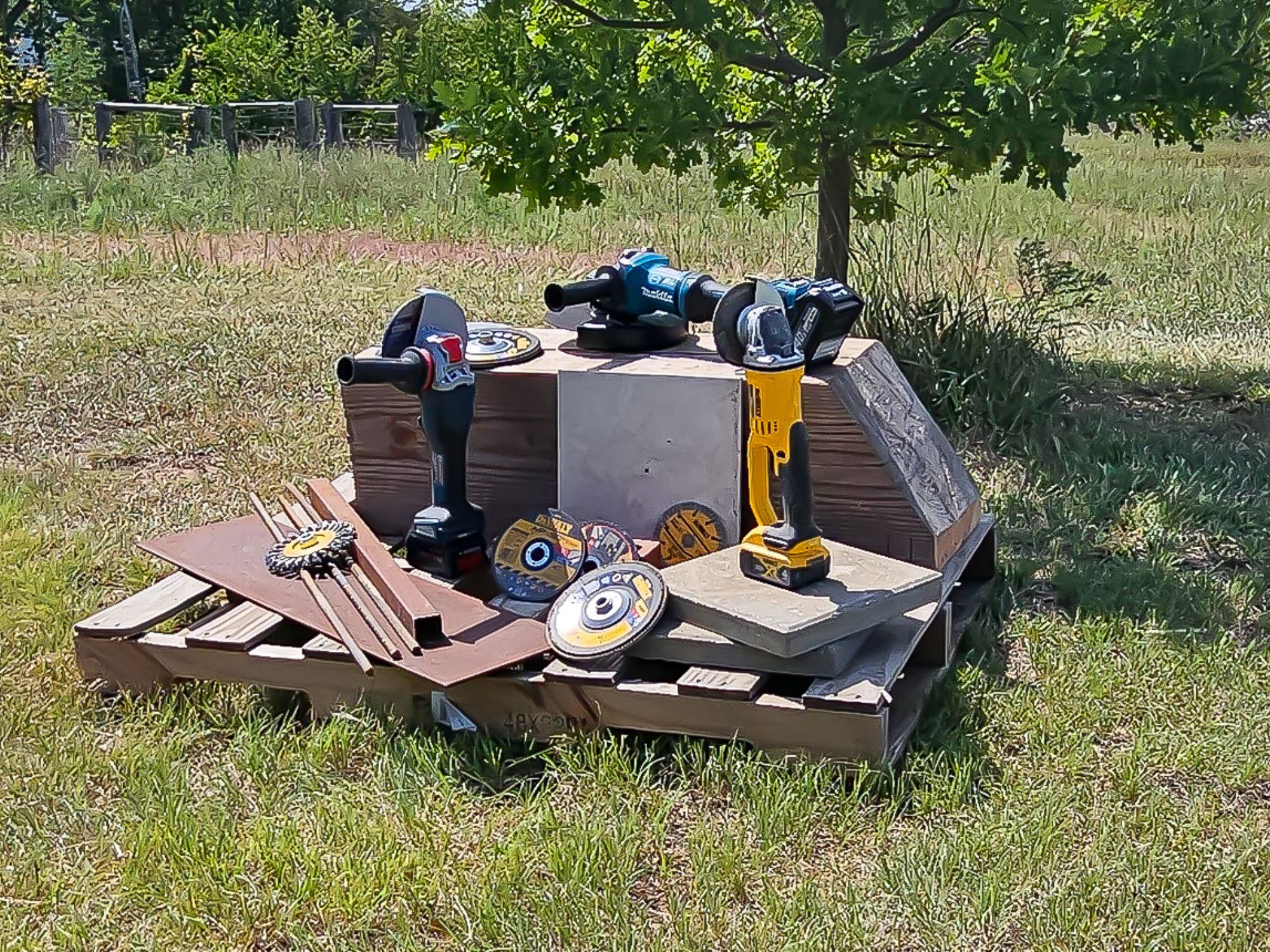
We used each grinder to cut through angle iron, switching grinders between each cut until we felt comfortable with each model’s strengths and weaknesses. We timed ourselves when cutting iron to determine how long each cut took and how easy the different models were to use.
Then, we attached different discs and polished rusted steel, scored bricks for precise breaks, restored weathered wood to its original fresh look, and cleaned out bolt threads until they looked new.
As we tested, we awarded points based on a rubric—the better an angle grinder performed on a test or assessment, the more points it received. After testing, we averaged the points to determine our top pick and categorize the other grinders as to their best use.
What to Consider When Choosing an Angle Grinder
When you’re shopping for the right angle grinder, there are a few things to understand before clicking “add to cart.” The best angle grinders may have unique features and different power sources, and some might simply be better suited to particulars.
Many models come with interchangeable discs—some made for cutting and others with an abrasive edge for grinding—that can be swapped out based on the application. For safety, a guard sits between the disc and the handle to protect the operator. Consider the following points when shopping for a good-quality grinder.
Disc Size
Angle grinders come in sizes, denoted by a number that refers to the maximum diameter of the grinding wheel or disc it will handle. For most DIY projects, a 4-, 4.5-, or 5-inch disc will suffice. In fact, these compact sizes and weights are ideal for DIYers, as larger discs can become unwieldy or tedious to work with.
Larger discs (up to 9 inches) are more commonly used in industrial situations by professionals and are able to cut through thick pieces of material. As the disc gets larger, the grinder itself must be larger to handle the cutting strength. This translates to a heavier tool that’s more likely to cause hand fatigue than small angle grinders.
Power Source and Motor Type
Angle grinders are available as corded and cordless models. Corded angle grinders typically generate more power at a consistent level due to the direct connection to the outlet. Many of these models provide 10,000 to 11,000 RPM. But corded models restrict the user to a physical location, limiting range without an extension cord. The cords can also be a tripping hazard and a nuisance while working on a project.
Typically, cordless angle grinders lack the sheer power of their corded counterparts. Functionality depends on battery capacity, so a dead battery could mean downtime in the middle of the project. On the plus side, cordless angle grinders offer hassle-free mobility and are better for use in tight spaces. These models deliver 8,500 to 9,000 RPM, which can work effectively for a wide range of grinding applications.
Additionally, the type of motor (brushed or brushless) can make a difference. While fewer angle grinders have brushed motors these days, some still exist. They’re often less expensive, but in time the brushes can wear out and need replacing. Brushless motors, on the other hand, last longer and provide more torque and power and are less likely to overheat than brushed motors.
Speed
Angle grinder speed is measured in RPM. Speeds typically range between 5,000 and 10,000 RPM, though some very robust grinders reach up to 12,000 RPM. Keep in mind, however, that the RPM rating is under “no-load” conditions, meaning that the disc isn’t cutting or grinding anything, just spinning in the air. Once the disc is cutting or grinding, that speed will lower considerably.
Obviously, the higher the RPM, the easier and more quickly the tool can cut through the target material. But the disc also becomes hotter at higher speeds and could be vulnerable to rupture, creating an injury risk. Be sure to use the correct disc for the task, and note the maximum supported speed marked on the disc. For example, a disc rated at 7,500 RPM that is running faster can break under the force, sending shards of the grinder wheel flying.
Voltage/Amperage
Angle grinders measure power output potential in volts and amperes (amps). Cordless angle grinders use volts to measure the power available from their battery, with most cordless models using 18V or 20V batteries and outliers ranging from 7.5 volts to 24 volts. The “magic number” in most cordless grinder power tools is 18 volts to 20 volts, offering the best mix of affordability and functionality.
Voltage readings on corded angle grinders only indicate whether they can be used with 120-volt or 220-volt power outlets. Shoppers can assess the power output potential of corded models by checking amperage, which ranges from 5 amps to 15 amps. Larger discs will require a larger output, so expect 7- or 9-inch grinders to have a higher power output potential.
Hand Guard
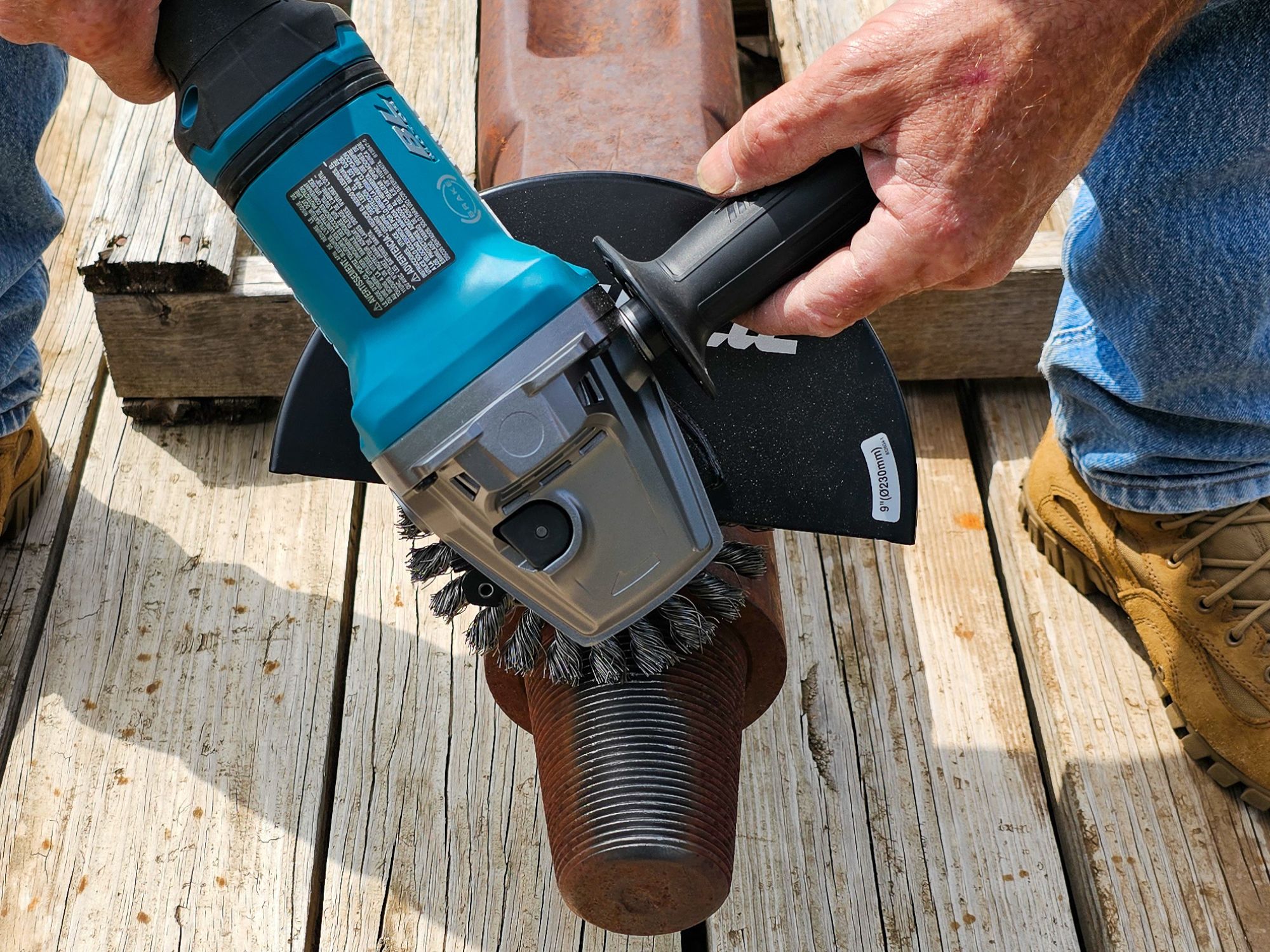
Since angle grinders are dangerous power tools, the hand guard is a crucial safety measure that covers half the disc. Its purpose is to protect the hands by preventing sparks and debris from flying toward the user. It also protects surfaces from damage when the grinder is used in tight spaces.
Some angle grinders have a movable guard, and others have a fixed guard. The movable option is more popular as it allows for left-handed or right-handed use and can adjust to better protect the user from flying debris. If left untightened, however, a movable guard can fall off the unit. Fixed guards are more robust, and there’s no risk of them coming off a grinder.
Soft Start
Because angle grinders are fast power tools, they can recoil a bit when they’re first powered up. This is particularly true if the grinding wheel is large and heavy. The recoil from the motor can result in the angle grinder jumping in the user’s hands, potentially causing serious injury.
To combat recoil, soft-start technology reduces the power output to the motor at first, slowly increasing until the angle grinder is fully up to speed. This throttled control over the power output prevents an angle grinder from recoiling during start-up, increasing safety while also reducing the jolt to the user’s arms and wrists.
Attachments
Matthew Consolo, the CEO and owner of Dreamscape Construction in Miami, Florida, tells us that he looks at an angle grinder as “the ultimate multi-tool.” He says that “you can use it for so many jobs with the right attachments” and shared some of his favorites:
- Wire disks: “Wire disks make removing paint, rust, and coating from hard surfaces easy. It really saves so much time.”
- Diamond discs: “These handle the tough jobs, cutting through granite, marble, and concrete. The great thing about diamond blades is you don’t need to wet the blade first.”
- Wire wheel brush: “These are excellent for strong metals. If you’re working on old iron gates or fences and want to get them prepped like new, a wire wheel brush is essential.”
Tips for Buying and Using an Angle Grinder
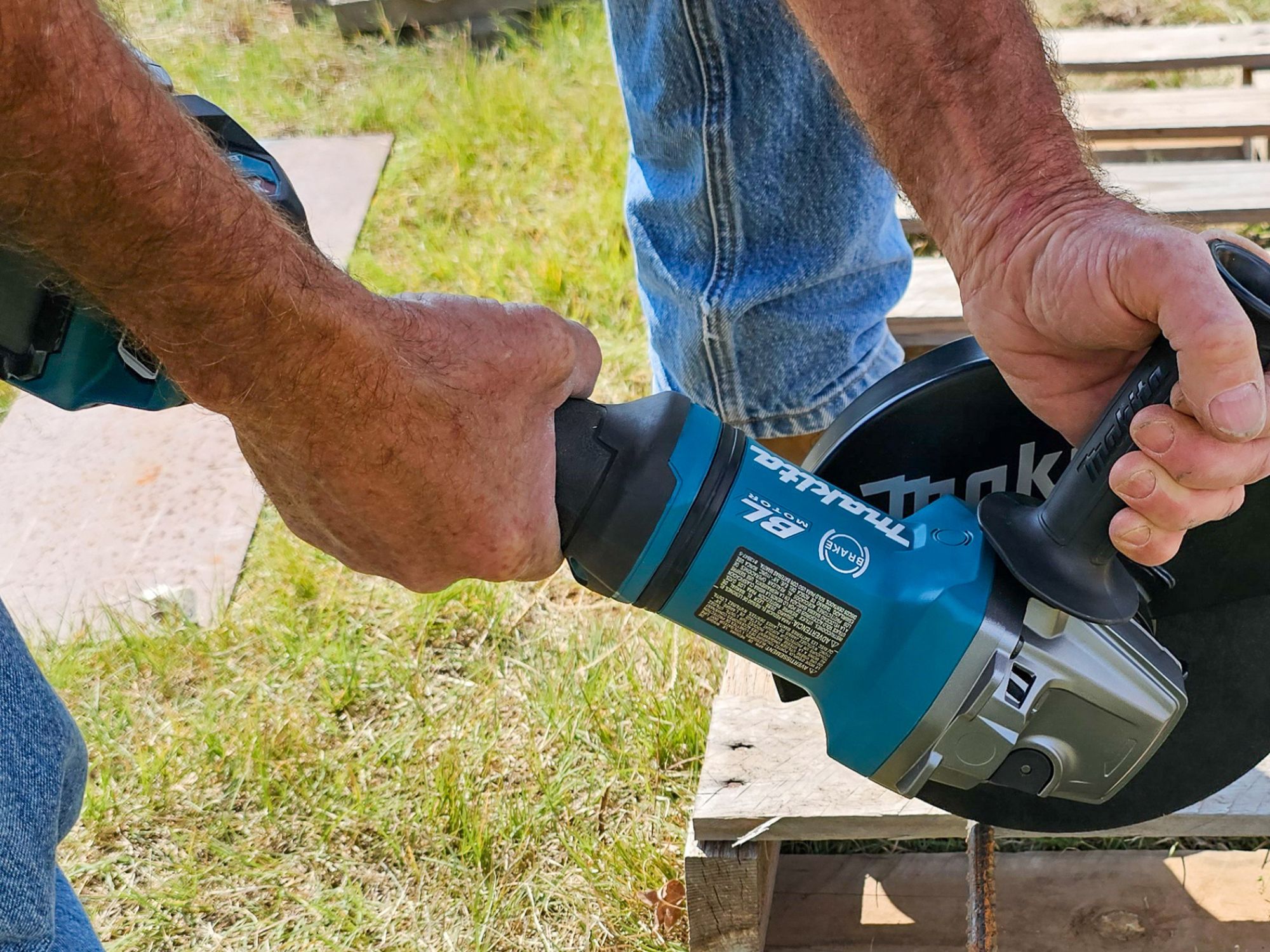
Keep the following information in mind when choosing and using an angle grinder.
- The most common DIY projects where an angle grinder will be of use—such as cutting tile or pipe, metalworking, or removing grout and mortar—rarely require more than a 4.5-inch grinder.
- The ongoing vibration of an angle grinder can cause what is known as hand-arm vibration syndrome (HAVS), with symptoms including pain and cold sensations in the user’s fingers, loss of grip strength, and a loss of sensation in the fingers and hands. An angle grinder with cushioned or vibration-absorbent material on the grip can protect hands from ongoing vibration.
- Always wear personal protective equipment including safety glasses/goggles, hearing protection, and respiratory protection when grinding.
- Check the model before use to ensure the disc and guard are properly attached and tightened. Discs and guards can become loose between angle grinder uses. Tighten them before connecting the power to the angle grinder.
FAQs
Even with that ample background on the best angle grinders, you might have some additional questions. Here, we answer some of the most common queries about angle grinders, so check for the info you need below.Even with that ample background on the best angle grinders, you might have some additional questions. Here, we answer some of the most common queries about angle grinders, so check for the info you need below.nal questions. Here, we answer some of the most common queries about angle grinders, so check for the info you need below.
The most common uses for angle grinders are metal grinding and cutting, such as steel for welding or metal piping. However, they’re also useful for wood carving, refinishing, and other projects. Some farriers even use them to trim horses’ hooves.
After attaching the correct disc for the job, hold the angle grinder in two hands for safety and security (the tool’s initial torque will cause it to jump). Push the trigger down or hit the power switch, and the disc will start rotating. Move the grinder until the rotating disc contacts the material you want to cut or grind.
When finished, release the trigger or switch off the power button and wait for the disc to stop rotating completely before placing it in a safe location, keeping in mind that the disc is still hot due to the friction caused during operation. Unplug the power cord or detach the battery and allow the tool to cool down.
An angle grinder can range in price from about $45 to over $550, though it’s more common for these tools to cost about $80 to $150. Cordless angle grinders may come with additional costs if the battery and/or charger is not included with the purchase of the tool itself.
Use a metal cutting disc on an angle grinder to cut through lead, iron, or copper, or cut screws without a problem. The rotating blade slices effortlessly through metal, but it’s essential to wear safety glasses and gloves because a significant amount of sparks are produced during the grinding process.
An angle grinder equipped with masonry discs can be used to cut through paving stones easily. Measure and mark where you want to cut the paver, then position it on a workbench like a bench grinder. Turn the grinder on and start to slowly cut into the paving stone. Once you make a cut on one side, you can turn the paver over and tap along the scored line and it should break smoothly along the line.
First, unplug the grinder or remove the battery. Then remove the nut that holds the disc in place, using the factory spanner included with the angle grinder. Replace the disc and tighten the nut bolt using the factory spanner.
Grinder discs usually are secured with a specialized nut that is typically tightened or removed with an included spanner. However, if you lose the spanner, the nut can still be removed with a set of vise grips. Simply tighten the vice on the grinder blade, locking it in position, then use your hand or a screwdriver to turn and remove the locking nut.
Instead of tossing your old angle grinder in the trash, take it to a local electronics recycling location. Typically, the municipality or town will have a program for recycling electronic tools and other devices, though some home improvement stores, like The Home Depot, also offer tool recycling programs.
Meet the Testers
Having been in the trades for more than 15 years as a contractor and building mechanic, Tom Scalisi is a freelance writer specializing in the home design, construction, tool, and automotive industries. He’s always looking for new tools and techniques while also sharing his knowledge with the DIY world.
Glenda Taylor is a contractor, product tester, and writer focusing primarily on construction techniques and power tools.
Additional research provided by Timothy Dale.
